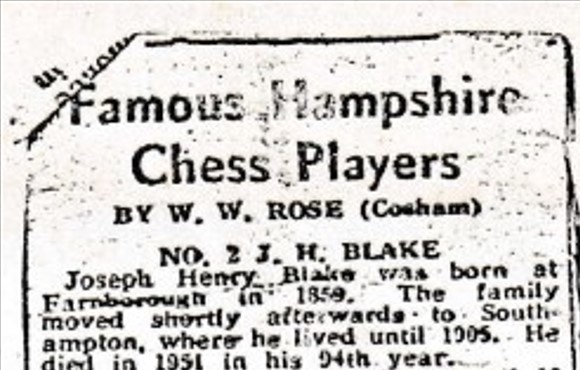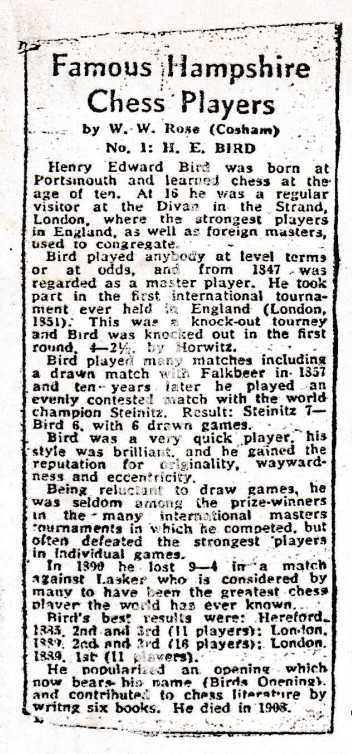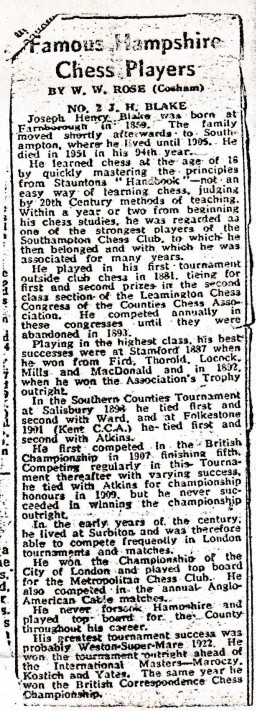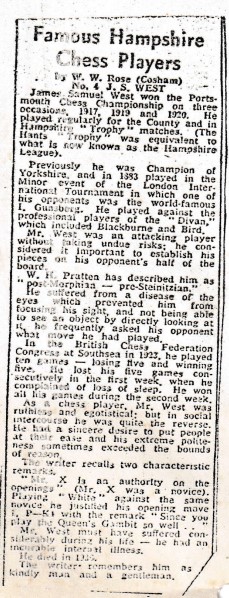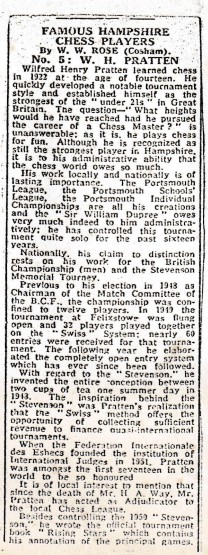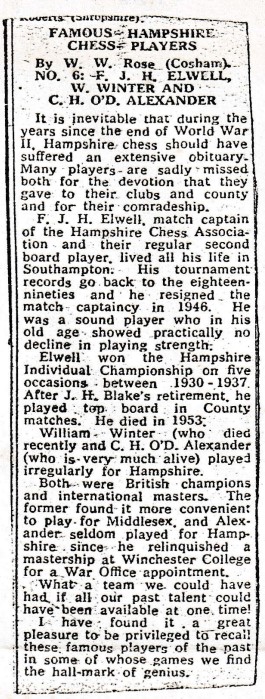A number of Hampshire player profiles were produced by Cosham Chess player WW Rose and published in the Portsmouth Evening News in 1961. The Hampshire Chess archivist at the time saved these, and I have reproduced them for the website. I think the original plan would have been for these to be published over eight weeks, but the last three were probably squeezed into week six.
It was an excellent selection of players, including three British Champions (Thomas, Winter and Alexander) and three players who were very prominent in Hampshire Chess circles (Blake, Elwell and Pratten). It would be interesting to see which Hampshire players would be included in a similar article now – I can certainly think of a few! In the future I will probably expand on some of these profiles, but I think it is interesting to detail this position from 1961.
These players included in the articles were as below, but as some of the articles are difficult to read, I have typed the information before the images.
Henry Edward Bird 1829 – 1908
Henry Edward Bird was born at Portsmouth and learned chess at the age of 10. At 16 he was a regular visitor at the Divan in the Strand, London where the strongest players in England, as well as foreign masters, used to congregate.Bird played anybody at level terms or at odds, and from 1847 was regarded as a master player. He took part in the first international tournament ever held in England (London 1851). This was a knock-out tourney and Bird was knocked out in the first-round 4-2½ by Horwitz (not sure why this is not 4½ – 2½ or 4 – 2 HCA Archivist).
Bird played many matches including a drawn match with Falkbeer in 1957 and ten years later he played an evenly contested match with the World Champion Steinitz. Result: Steinitz 7 Bird 6 with 6 drawn games.
Bird was a very quick player, his style was brilliant, and he gained the reputation for originality, waywardness and eccentricity.
Being reluctant to draw games, he was seldom among the prize-winners in the many international master tournaments in which he competed, but often defeated the strongest players in individual games.In 1896 he lost 9 – 4 to in a match against Lasker who is considered by many to have been the greatest chess the world has ever known.
Bird’s best results were Hereford 1883. 2nd and 3rd (11 players): London 1889. 2nd and 3rd (16 players): London 1889. 1st (11 players).
He popularised an opening which now bears his name (Birds Opening) and contributed to chess literature by writing six books. He died in 1908.
WW Rose – Portsmouth News 1961
Joesph Henry Blake 1859 – 1951
Joseph Henry Blake was born at Farnborough in 1859. The family moved shortly afterwards to Southampton, where he lived until 1905. He died in 1951 in his 94th year.
He learned chess at the age of 16 by quickly mastering the principals from Staunton’s “Handbook” – not an easy way of learning chess, judging by 20th century methods of teaching. Within a year or two from beginning his chess studies, he was regarded as one of the strongest players of the Southampton Chess Club, to which he then belonged and with which he was associated for many years.
He played in his first tournament outside club chess in 1881, tying for first and second prizes in the second-class section of the Leamington Chess Congress of the Counties Chess Association. He competed annually in these congresses untill they were abandoned in 1893.
Playing in the highest class his best successes were at Stamford 1887 when he won from Bird, Thorlond, Locock, Mills and MacDonald and in 1892 when he won the Association’s Trophy outright.
In the Southern Counties Tournament at Salisbury 1898 he tied first and second with Ward, and at Folkestone 1901 (Kent C.C.A) he tied first and second with Atkins.
WW Rose – Portsmouth News 1961
Sir George Thomas 1881 – 1972
GA Thomas was 14 times champion of the Portsmouth Chess Club – a mere trifle compared with his achievements on the international field of chess, but it must be remembered that Portsmouth was then the only club and its membership consisted of the best players in the surrounding districts.
He learned chess from his mother and was a member of the Portsmouth club from 1900 to 1915. At the turn of the century, he met J.H. Blake “over the board” in Portsmouth v Southampton matches. He joined the Army in World War I, and contracted malaria during his service abroad. This resulted in his health being more or less permanently affected.
It did not however, prevent him from resuming his chess, and he continued to be a prominent champion of the city of London and with F.D. Yates, proved that Britain was not without chess masters.
His style was sound rather than brilliant and he possessed a theoretical knowledge surpassed by none. He was not a frequent competitor abroad but nevertheless during his career played against all the greatest players of the time, including the then past, present and future world champions Lasker, Capablanca, Alekhine, Euwe and Botvinnik.
In tournament play, he was a “safe bet” and consistently won and drew against the weaker players lost and drew against the strong ones.
Occasionally however, he would “beat the book” by defeating a Grand Master. When he did so, it is interesting to note that he won characteristically by building a strong position, creating weaknesses in his opponent’s game and finally executing his plan by his supreme tactically knowledge,
This is certainly more praiseworthy than winning by a trap or by takin an opponent by surprise by a breath-taking sacrifice. Thomas was by no means a nervous type and would sit at the board absolutely calm under all circumstances. He was described by a foreign player as “a perfect gentleman who never disturbed others.”
He impressed the writer as being quiet, unassuming, and unexcitable and that one must be on his best behaviour when in his company.
He was an expert at simultaneous play and his exhibitions were regular features in the congresses. Like JH Blake, he was a great annotator of master games.
Thomas won the British Championship on two occasions – Southsea 1923 and Yarmouth 1935.
WW Rose – Portsmouth News 1961
He celebrates his 80th birthday this month and all Chess Players will wish the Grand Old Man of British Chess “many happy returns.”
JS West 1851 – 1937
James Samuel West won the Portsmouth Chess Championship on three occasions, 1917, 1919 and 1920. He played regularly for the County and in the Hampshire “Trophy” matches. (The Hants “Trophy” was equivalent to what is now known as the Hampshire League).
Previously he was Champion of Yorkshire and in 1883 played in the Minor event of the London International Tournament in which one of his opponents was the world-famous I Gunsberg. He played against the professional players of the “Divan,” which included Blackburne and Bird.
Mr. West was an attacking player without taking undue risks: he considered it important to establish his pieces on his opponent’s half of the board.
WH Pratten has described him as “post-Mophian – pre-Steinitzian”.
He suffered from a disease of the eyes which prevented him from focusing his sight, and not being able to see an object directly looking at it, he frequently asked his opponent what move he had played.
In the British Chess Federation Congress at Southsea in 1923, he played ten games – losing five and winning five. He lost his five games consecutively in the first week, when he complained of loss of sleep. He won all his games in the second week.
As a chess player, Mr West was ruthless and egotistical; but in social intercourse he was quite the reverse. He has a sincere desire to put people at their ease and his extreme politeness sometimes exceeded the bounds of reason.
The writer recalls two characteristic remarks.“Mr X is an authority on the openings” (Mr. X was a novice).
Playing “White” against the same novice he justified his opening move P-K4 with the remark “Since you play the Queen’s Gambit so well ..”
Mr West must have suffered considerably during his life – he had an incurable internal illness. He died in 1937
WW Rose – Portsmouth News 1961
The Yorkshire Chess History website has additional details on JS West – HCA Archivist.
WH Pratten 1908 – 1985
Wilfred Henry Pratten learned chess in 1922 at the age of fourteen. He quickly developed a notable tournament style and established himself as the strongest of the “under 21s” in Great Britain. The question – “What heights would he have reached had he pursued the career of a Chess Master?” is unanswerable as it is he plays chess for fun. Although he is recognised as still the strongest player in Hampshire it is to his administrative ability that the chess world owes so much.
His work locally and nationally is of lasting importance. The Portsmouth League, the Portsmouth School’s league, the Portsmouth Individual Championship are all his creations and the “Sir William Dupree” owe very much indeed to him administratively: he has controlled this tournament quite solo for the past sixteen years.
Nationally, his claim to distinction rests on his work for the British Championship (men) and the Stevenson Memorial Tourney.
Previous to his election in 1948 as Chairman of the Match Committee of the B.C.F. the championship was confined to twelve players. In 1949 the tournament at Felixstowe was flung open and 32 players played together on the “Swiss” System: nearly 60 entries were received for that tournament. The following year he elaborated the completely open entry system which has ever since been followed.
With regard to the “Stevenson.” He invented the entire conception between two cups of tea one summer day in 1943. The inspiration behind the “Stevenson” was Pratten’s realization that the “Swiss” method offers the opportunity of collecting sufficient revenue to finance quasi- international tournaments.
When the Federation Internationale des Eshecs founded the institution of International Judges in 1951, Pratten was amongst the first seventeen in world to be honoured.
It is of local interest to mention that since the death of Mr HA Way Mr Pratten has acted as Adjudicator to the local Chess League.
Besides controlling the 1959 “Stevenson” he wrote the official tournament book “Rising Stars” which contained his annotations of the principal games.
WW Rose – Portsmouth News 1961
Additional details on WH Pratten including 545 games can be found on Britbase.
FJH Elwell 1870 – 1953
It was inevitable that during the years since the end of World War II Hampshire chess should have suffered an extensive obituary. Many players are sadly missed both for their devotion that they gave to their clubs and country for the comradeship.
FJH Elwell, match captain of the Hampshire Chess Association and their regular second board player, lived all his life in Southampton. His tournament records go back to the eighteen nineties, and he resigned the match captaincy in 1946. He was a sound player who in his old age showed practically no decline in playing strength.
Elwell won the Hampshire Individual Championship on five occasions between 1930 – 1937. After JH Blake’s retirement he played top board in County matches. He died in 1953.
WW Rose – Portsmouth News 1961
William Winter 1897 – 1955 and CH O’D Alexander 1909 – 1974
William Winter (who died recently and CH O’D Alexander (who is very much alive) played irregularly for Hampshire.
Both were British champions and international masters. The former found it more convenient to play for Middlesex, and Alexander seldom played for Hampshire since he relinquished a mastership at Winchester College for a War Office appointment. (Bletchley Park and GCHQ which may not have been allowed to state at the time – HCA Archivist).
What a team we could have had if all our past talent could have been available at one time!
I have found it a great pleasure to be privileged to recall these famous players of the past in some of whose games we find the hallmark of genius.
WW Rose – Portsmouth News 1961
Additional details on:
Famous Hampshire Chess Players
Acknowledgements and sources:
- Portsmouth Evening News
- Britbase
- Yorkshire Chess History Website (no longer updated, but some fantastic articles)
